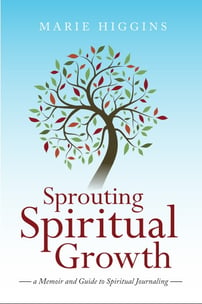As a small business owner in the personal health services industry in the northeast United States, cancelations occur often in the early months of the year due to winter weather and acute medical conditions. With the pandemic, there have also been cancelations, not because the client is sick, but because they have been exposed to the Covid-19 virus; as a result, I have been experiencing a higher number of cancelations, translating into less income than is routine for this time of year.
While a fearful person might worry excessively, one can learn to turn away from that fear. One way is to see the resources already at hand. To take this look, let’s start with the parable of the drowning man. You probably know it, or some version of it.
In it, the flood waters are rising in a man’s house, and this man sends away the rescuers who come by in a small boat, and then by a bigger boat, and finally by helicopter. Each time, when the man turns the rescuers away, he says to them, “God will save me!” Eventually the waters destroy the man’s house and he drowns. When he arrives in the afterlife and questions God, God responds, “I did hear your cries! I sent rescuers, boats, and a helicopter!”
The first step, then, is to identify a pressing need.
JOURNAL PROMPT:
What help do I specifically need now? (If nothing currently, journal about a recent situation).
We all need help. Maybe it is that we don’t know how to do something, and need someone else’s expertise. Maybe we lack the energy to do something ourselves, and need someone else’s actions to get us through a crisis. There are so many reasons and it doesn’t need to be a life-saving need like in the parable. It could even be just a small problem which needs solving now. Maybe it is a transportation issue, or something little in other areas such as career, finances, health, spirituality, relationships, household activities, and so on.
JOURNAL PROMPT:
What/who are my obvious resources/rescuers?
In my career situation, I am aided by a group of entrepreneurs who have been meeting monthly for over five years. Collectively, we share information and knowledge. It has been so helpful during the pandemic, as we have shared information about local resources and federal funding. It is here that I have shared my on-going challenges. As a result, in 2020 I learned about a loan program for small businesses to cover expenses as well as lost income caused by the pandemic. While I was uncertain as to how much and whether or not to borrow at all, the group helped me to see that it was prudent, and so I did. I liken these entrepreneurs to the rescuers in the parable.
I also recognize that I needed to let it be known that I needed help (to scream out the windows, to stand on the rooftop!). For some of us, sharing our story is the hardest part of getting the help we need.
JOURNAL PROMPT:
Write about how you are willing or not willing to share your story, to let others help and to accept the help offered.
For me, I have grown more comfortable sharing my situation; it is accepting the help offered that can prove difficult. Elaborating on my personal example, while I needed some of the loan funds immediately, I saved the remainder “for a rainy day.” And yet, once the wintry, extra-cancellations months came, I thought, “I do not want to use these funds. I want to hold onto them, for a bigger rainy day.” This, I liken to turning away the boats and the helicopter, and frankly, not even acknowledging the “rain” and “rising flood waters.” Fortunately, I quickly saw that I was “drowning.” The signs of it were things like passing up
an opportunity to take a class that would be beneficial to clients now, and not immediately reordering supplies in order to cut short-term expenses.
Unlike the man in the parable, I saw that I have an abundance of help available to me. As a result, I am using these funds as they were intended – to help me, a small business owner, stay afloat during the pandemic. Because the pandemic still impacts my business AND I still have funds from the loan, it is important that I recognize the usefulness today. This abundance allows me to be abundant with the instructors and merchants who offer services, because I can utilize their services today. In this way, I can also, in turn, benefit their businesses.
As a side note, it is good I didn’t wait to reorder supplies because I learned many things were on backorder and therefore would not be delivered quickly!
Now, let’s look at one last point and journal prompt; that is, unlike the man in the parable, we can know that God* is in our everyday circumstances in ordinary ways. We can have these conversations through spiritual journaling.
JOURNAL PROMPT:
God*, what do you want me to know about my current situation?
Don’t second guess yourself on this one. Write whatever comes to you, even if you think it is just your own mind’s voice speaking. In this way, you are getting a two-way conversation started.
Involving God* is what makes your journaling a spiritual experience, and it is so simple. You simply need to ask God* what you should know!
In summary, if this exercise reveals to you that you didn’t notice the help that was available to you, don’t fret, because it is now not lost on you. Becoming aware of what “boats and helicopters” are available is the first step to knowing that help is always available, whatever the circumstances. Secondarily, expect that the perfect solution is in front of you at all times. Take a breath before you send the rescuers away. The rescuers just might have the perfect vehicle, the perfect solution for you! Finally, make your journaling a spiritual experience by asking God* what you should know.
*For this column, I want to define God by not defining God. I suggest that each of us use the term which feels most comfortable. I use God as a universal term. You may decide that Spirit, Great Spirit, Higher Power, Sensibility, Best Self, or SOMETHING else better suits you. It is not for me to decide what term you use. It is only for me to decide which term I use. I often use the term God.

Author bio: Marie Higgins left corporate America after more than 15 years in human resources management to pursue life. Before long she found massage therapy and became a nationally certified, state-licensed massage therapist. At the same time, she felt a partial hardening of the heart, figuratively and spiritually, so she found a spiritual coach to help, and became an active journaling person. Included in her journals are the gratitude lists that helped her heart soften and moved her to write poetry. In 2017 she included these poems in her debut book, Sprouting Spiritual Growth: A Memoir and a Guide to Spiritual Journaling. Since then Marie maintains a journaling practice that includes writing poetry whenever inspiration strikes. Marie lives in suburban Philadelphia with her husband, two young adult children and an active foxhound.
Marie Higgins left corporate America after more than 15 years in human resources management to pursue life. Before long she found massage therapy and became a nationally certified, state-licensed massage therapist. At the same time, she felt a partial hardening of the heart, figuratively and spiritually, so she found a spiritual coach to help, and became an active journaling person. Included in her journals are the gratitude lists that helped her heart soften and moved her to write poetry. In 2017 she included these poems in her debut book, Sprouting Spiritual Growth: A Memoir and a Guide to Spiritual Journaling. Since then Marie maintains a journaling practice that includes writing poetry whenever inspiration strikes. Marie lives in suburban Philadelphia with her husband, two young adult children and an active foxhound.



Leave Comment